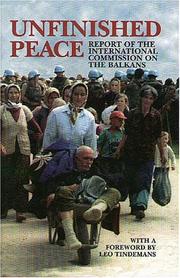| Listing 1 - 10 of 33 | << page >> |
Sort by
|
Book
ISBN: 0855160829 Year: 1992 Publisher: London : Royal United Services Institute for Defence Studies,
Abstract | Keywords | Export | Availability | Bookmark
 Loading...
Loading...Choose an application
- Reference Manager
- EndNote
- RefWorks (Direct export to RefWorks)
Book
ISBN: 9783030144234 Year: 2020 Publisher: Cham, Switzerland : Palgrave MacMillan,
Abstract | Keywords | Export | Availability | Bookmark
 Loading...
Loading...Choose an application
- Reference Manager
- EndNote
- RefWorks (Direct export to RefWorks)
This book examines the evolution of liberal peacebuilding in the Balkans since the mid-1990s. After more than two decades of peacebuilding intervention, widespread popular disappointment by local communities is increasingly visible. Since the early 2010s, difficult conditions have spurred a wave of protest throughout the region. Citizens have variously denounced the political system, political elites, corruption and mismanagement. Rather than re-evaluating their strategy in light of mounting local discontent, international peacebuilding officials have increasingly adopted cynical calculations about stability. This book explains this evolution from the optimism of the mid-1990s to the current state through the analysis of three main phases, moving from the initial 'rise', to a later condition of 'stalemate' and then 'fall' of peacebuilding.

ISBN: 087003118X Year: 1996 Publisher: Berlin Washington, DC Aspen Institute Carnegie Endowment for International Peace
Abstract | Keywords | Export | Availability | Bookmark
 Loading...
Loading...Choose an application
- Reference Manager
- EndNote
- RefWorks (Direct export to RefWorks)
Book
Year: 2001 Publisher: Brussels : International Crisis Group,
Abstract | Keywords | Export | Availability | Bookmark
 Loading...
Loading...Choose an application
- Reference Manager
- EndNote
- RefWorks (Direct export to RefWorks)
Book
ISBN: 9638523093 Year: 2003 Publisher: Budapest : Central European University,
Abstract | Keywords | Export | Availability | Bookmark
 Loading...
Loading...Choose an application
- Reference Manager
- EndNote
- RefWorks (Direct export to RefWorks)
Book
Year: 1969 Publisher: London : Macdonald,
Abstract | Keywords | Export | Availability | Bookmark
 Loading...
Loading...Choose an application
- Reference Manager
- EndNote
- RefWorks (Direct export to RefWorks)
Book
ISBN: 9781849040747 1849040745 Year: 2011 Publisher: London : Hurst,
Abstract | Keywords | Export | Availability | Bookmark
 Loading...
Loading...Choose an application
- Reference Manager
- EndNote
- RefWorks (Direct export to RefWorks)
Balkan Peninsula --- Balkans --- History --- Politics and government --- Histoire --- Politique et gouvernement --- BALKAN PENINSULA--POLITICS AND GOVERNMENT --- BALKAN PENINSULA--HISTORY
Book
ISBN: 9781108499910 9781108752466 9781108718660 Year: 2019 Publisher: Cambridge Cambridge University Press
Abstract | Keywords | Export | Availability | Bookmark
 Loading...
Loading...Choose an application
- Reference Manager
- EndNote
- RefWorks (Direct export to RefWorks)
The collapse of the communist monopoly across Central and Southeastern Europe in 1989/1990 initiated a process of rapid political, economic, and cultural change. While Bosnia-Herzegovina, Croatia, and Serbia went on to suffer three-and-a-half years of war, all the states of the region have confronted challenges as they dismantled communist institutions and drafted new laws, in some cases ignoring their own laws. Indeed, in certain countries, local politicians have done their best to corrupt the media and the economy, with recent years seeing some states move in an illiberal direction. Throughout the region, however, there has been a strong interest in enjoying the benefits of membership of the European Union and NATO. In this updated second edition, regional specialists comprehensively analyze the post-communist trajectories of the states of Central and Southeastern Europe, encompassing democratization, privatization, corruption, and war.
Book
ISBN: 9783205782667 Year: 2010 Publisher: Wien : Bohlau,
Abstract | Keywords | Export | Availability | Bookmark
 Loading...
Loading...Choose an application
- Reference Manager
- EndNote
- RefWorks (Direct export to RefWorks)
Book
Abstract | Keywords | Export | Availability | Bookmark
 Loading...
Loading...Choose an application
- Reference Manager
- EndNote
- RefWorks (Direct export to RefWorks)
| Listing 1 - 10 of 33 | << page >> |
Sort by
|

 Search
Search Feedback
Feedback About UniCat
About UniCat  Help
Help News
News